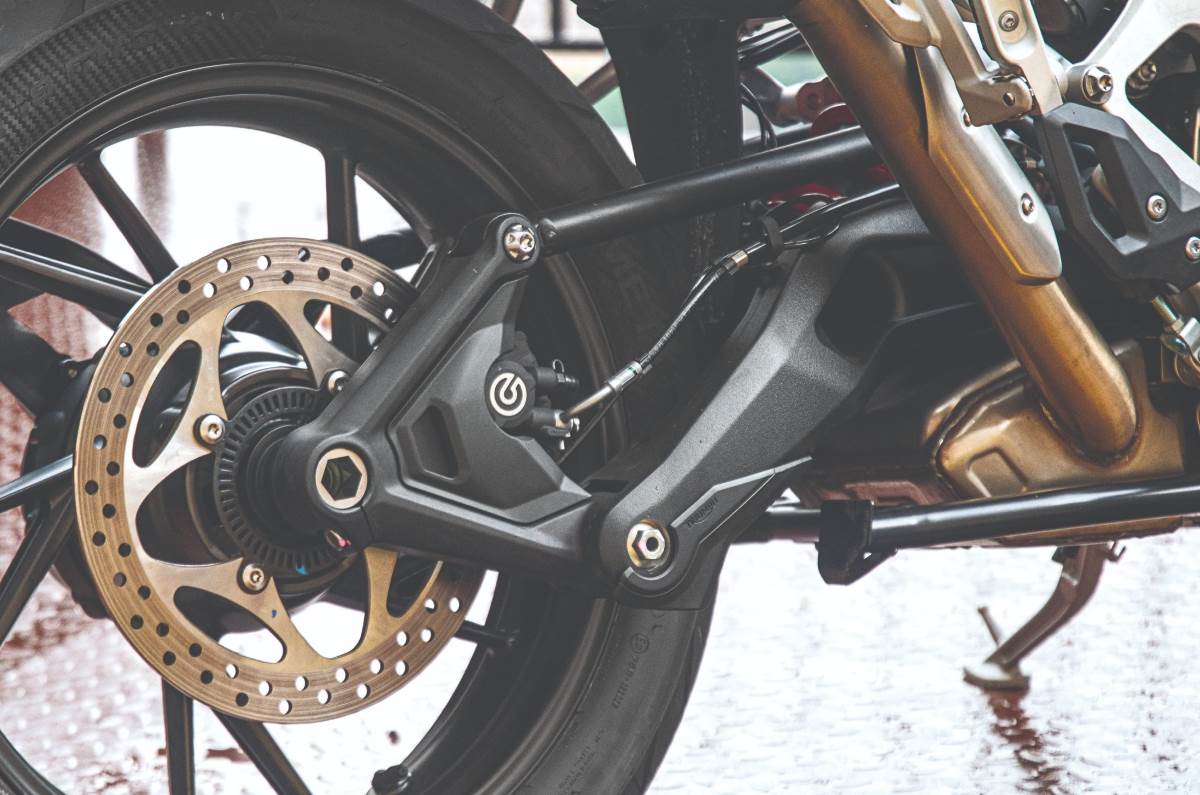Triumph’s all new Tiger 1200 is super sized and super capable.
The Triumph Tiger 900 Rally is quite easily my favourite of the middleweight adventure bikes on sale in India. So when Triumph effectively added the same recipe to its full-sized Tiger 1200, things looked promising indeed.
Triumph has brought a total of four Tiger 1200s to India. You’ll get to read about the off-road ready Tiger 1200 Rally Pro and the more road-biased Tiger 1200 GT Pro in this review. The other two bikes are the Tiger 1200 Rally Explorer and the Tiger 1200 GT Explorer. Both the Explorer models get bigger 30-litre fuel tanks and a few more features, including a radar assisted blind spot warning system, but we didn’t get to experience the Explorers on this launch event. We rode the Rally Pro first, so let’s start with that motorcycle.
Heavy hitter
What you want to know right away is that this is a new platform from the ground-up. Everything is different, including the chassis, engine and the shaft drive design, and the big idea was to lose weight. Triumph has done that in many ways. The chassis is now 5.5kg lighter and the fuel tank is made from aluminum. The 1200 doesn’t have a single sided swingarm any more, but they’ve got a tri-link twin-sided unit that has helped save one-and-a-half kilos.
In total, the 240kg base Tiger 1200 (which isn’t sold here) is about 25kg lighter than the previous generation bike. At 249kg, the 1200 Rally Pro weighs the same as a BMW R 1250 GS Pro, which is exactly the competition Triumph is going after.
Less weight is always a good thing, but this is still a huge and heavy motorcycle. It’s tall as well. Seat height is 875mm on the Rally Pro and you can raise that to 890mm if you like. This is one of the few motorcycles that I (6’1”) actually find a little tall, and when it’s on the main stand, I’m on my tip toes. In fact, the new Tiger’s seat height is actually higher than the old model, but Triumph says this is offset by a slimmer section where the rider’s legs would extend to meet the ground.
The Tiger 1200 runs a new tubular steel frame, but the bigger talking point is the new Showa suspension. This bike has electronic suspension as standard on all the models and I think it’s the only bike in the segment that does that. Triumph has kept the electronic adjustment simple, so you don’t have confusing terms like compression and rebound, all you have to do is go into the damping menu and select from nine levels between comfort and sporty. We found two levels up from Comfort to work well on and off road.
There’s an interesting thing going on at the rear. Essentially this shock can also automatically adjust the spring preload based on whether you’re riding solo, with a pillion or with luggage and it adjusts the preload accordingly, which is a very convenient and clever feature.
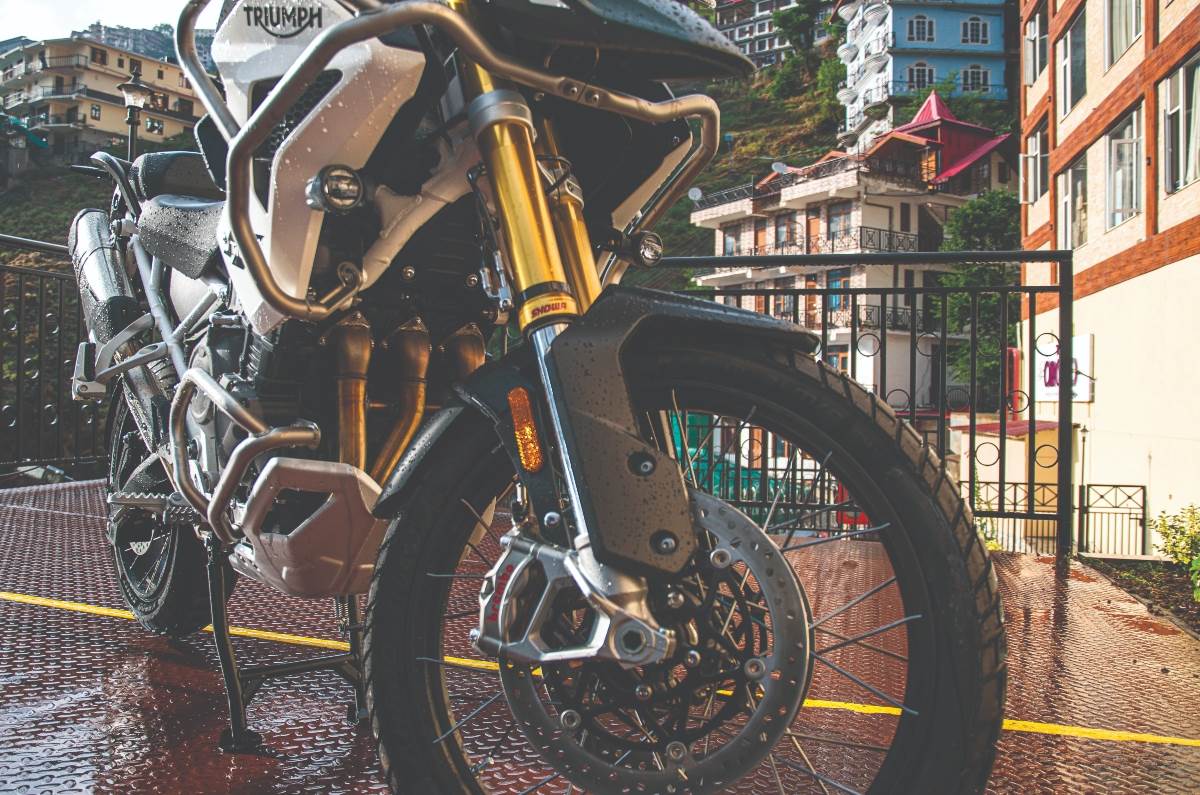
New Showa suspension is outstanding.
The new 1200 is really very well-equipped. You have the usual adventure bike luxuries like cruise control, hill hold and heated grips, but you also have a keyless start system and a keyless fuel filler cap. There’s also a gorgeous new 7-inch TFT display, although it takes quite a while to boot up. We counted just over ten seconds before it was fully loaded.
When it’s ready, it’s a really good looking screen with some cool animations. That being said, it’s a little confusing to use and you cannot view basic trip data unless you go into the settings menu to find it. The fuel gauge also takes a while to respond when the 20-litre fuel tank has been filled with fuel. The bike can also be a little slow to respond when you inevitably stall it off road and try to quickly fire the engine back up.
The Tiger’s roar
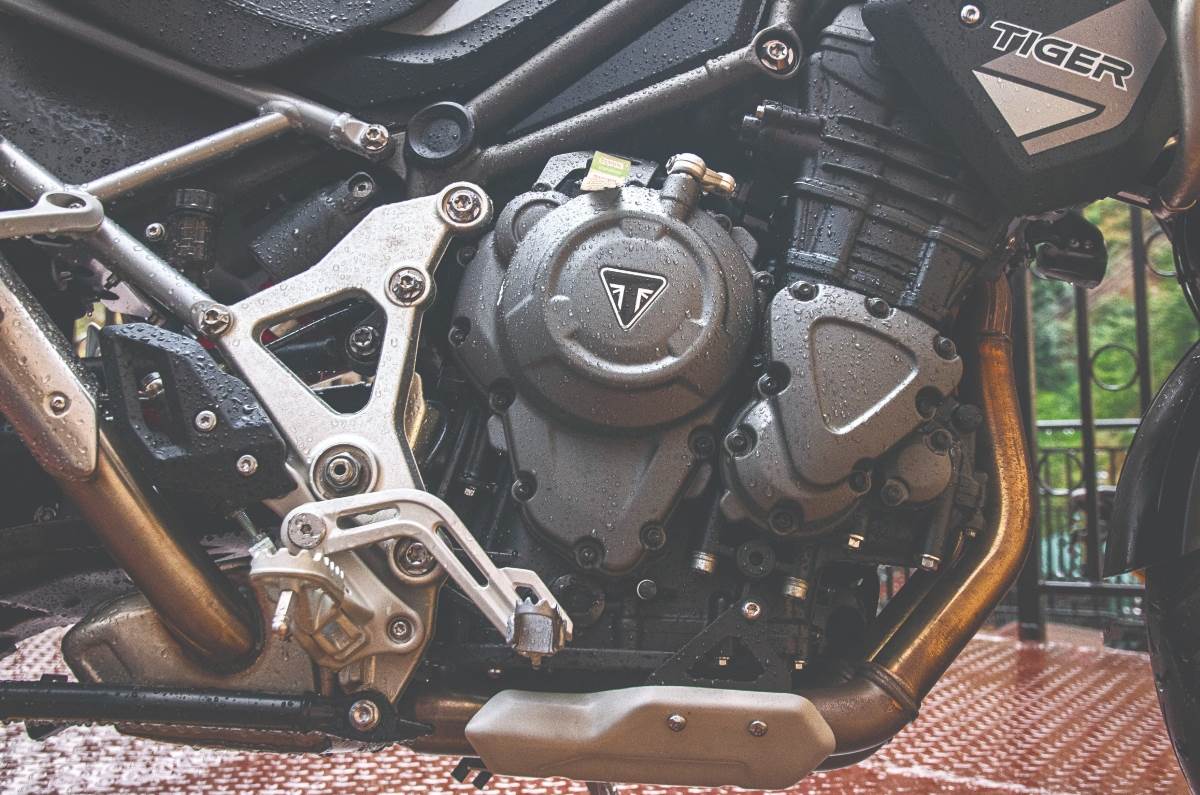
New T-plane engine has a similar feel to Tiger 900.
What most certainly isn’t slow to respond, though, is this Tiger’s brand new engine. The base bore and stroke dimensions are the same as the new Speed Triple, but that’s where the similarities end. This 1160cc motor has the same T-plane crankshaft set-up that we first saw in the Tiger 900, and that’s completely changed the character of the engine. Basically it has changed the firing order of the cylinders from 1-2-3 to 1-3-2.
It’s almost like a twin-cylinder engine both in terms of sound and its solid mid-range push. This is an engine that many people won’t like at the first experience, especially if they loved the old Tiger’s sportbike shriek. But believe me, it really grows on you.
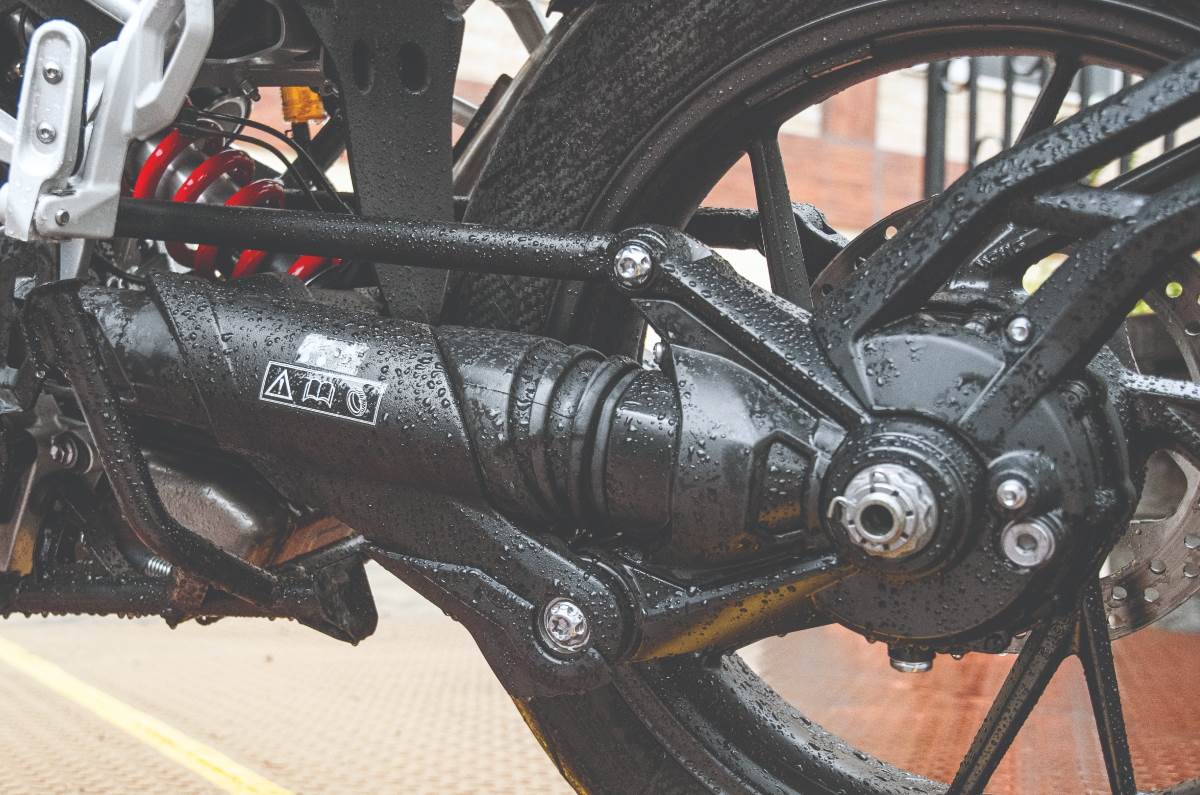
Joins the GS as the only shaft driven options in the segment.
Because we exclusively rode this bike in the mountains around Shimla and Narkanda, it never really ventured much beyond third gear. Nevertheless, it feels properly quick, as you would expect from a 150hp motorcycle. The fuelling itself is also quite smooth, but we did notice that there’s a lag followed by a slight jerk when you open the throttle. It feels almost like the bike is running a loose chain, but this is actually the drive shaft system engaging when you open the throttle, which is occasionally accompanied by an audible clunking sound.
On the plus side, the six-speed gearbox is slick and the bike has an outstanding up and down quickshifter. It also has a superb set of brakes that are powerful on the road, but easy to modulate off-road.
As you’d expect, there’s a vast array of electronic rider aids including tunable riding modes. But in typical Triumph fashion, the traction control system can be too intrusive, especially over broken roads. The system is best turned fully off when riding off road.
For the long haul
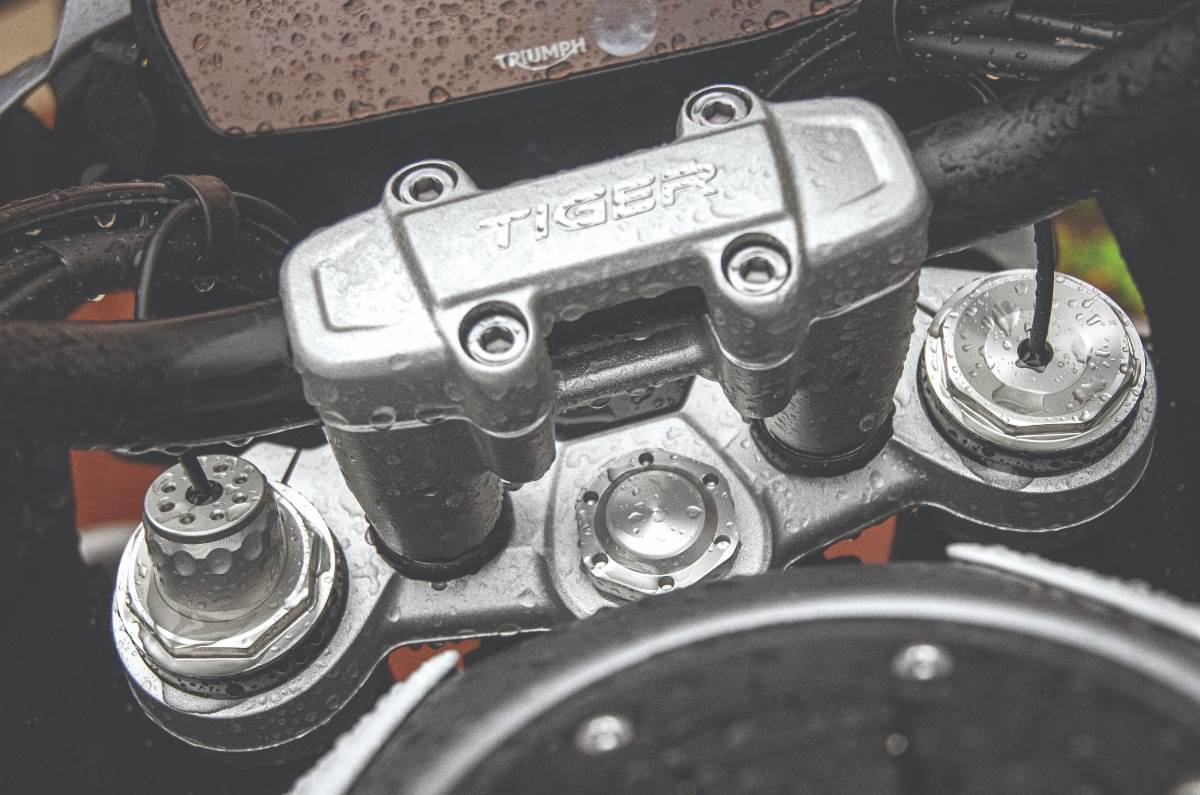
Semi-active suspension uses unusually thin wires.
This is an adventure bike, so long-distance comfort is paramount and it comes as no surprise that the Tiger 1200 is very comfortable. The riding position is upright and quite neutral with slightly rear-set foot pegs and a wide handlebar. The seat is super comfortable and you can sit like this all day long.
The Tiger 1200 gets a similar one hand adjustable windscreen set up to the Tiger 660 and like with that bike, it’s not very easy to use and it can get jammed with dirt when riding off-road.
The standing up position for riding off road is quite good, but you will notice that the three cylinder engine sets your feet quite wide apart. Really tall riders may benefit from a slightly higher handlebar as well as some grip tape on the fuel tank.
On the road
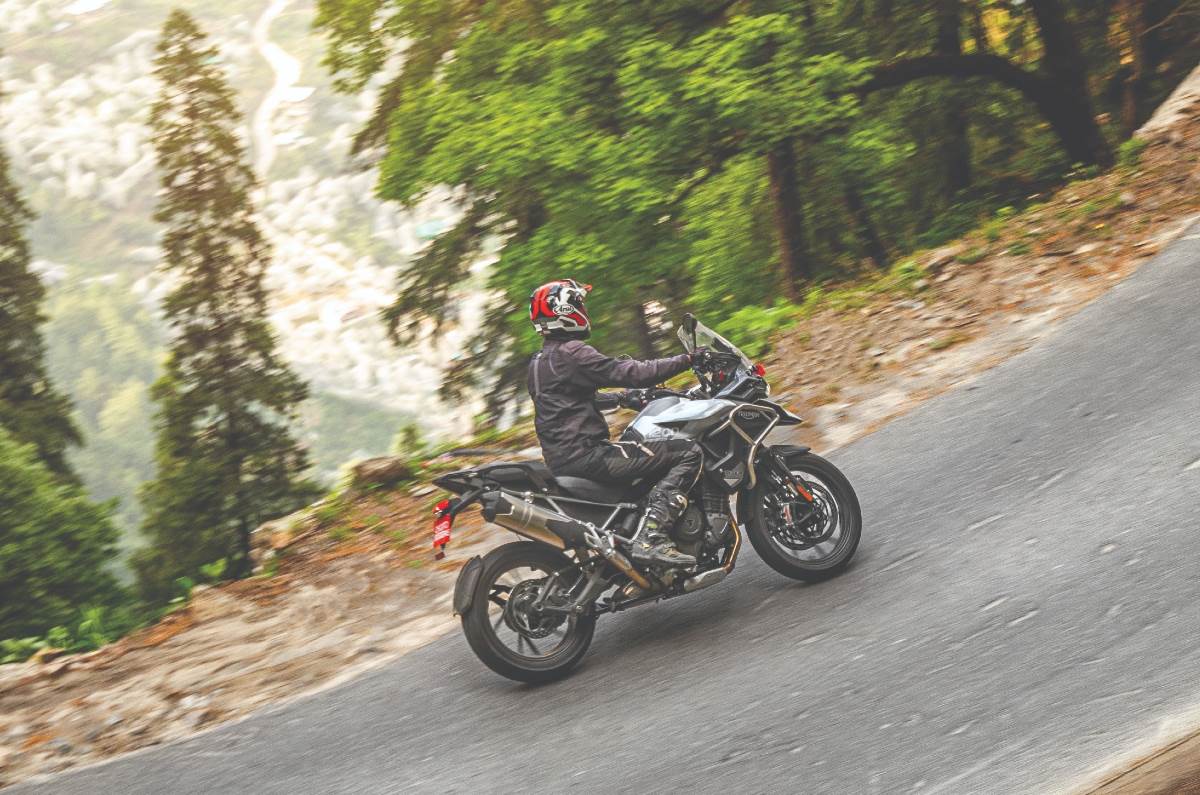
With its smaller and fatter front tyre, the GT handles even better than the already impressive Rally.
Compared with the old Tiger, this one feels easier on its feet and far more capable. Out on the winding roads around Shimla, the steering felt surprisingly agile for something that is this big and heavy. Side to side transitions take less effort than you might expect and the bike can hammer down a fast flowing road in a most enjoyable manner. But it’s off the road where the Tiger 1200 is truly impressive.
The Showa suspension does a fantastic job – it simply eats through rocky broken rutted roads and you can really carry a lot of speed without the bike getting upset. It just stays stable and communicative with its dirt-bike sized 21-inch front wheel and 18-inch rear wheel.
The grand tour
At first glance, the GT looks very similar to the Rally, and that’s because it effectively is. The chassis, engine and bodywork are all the same, but there are a few key differences. First, there’s the switch to alloy wheels – this time it’s a 19-inch front while the rear remains an 18-inch unit. The bike also has different tyres and its running Metzeler Tourances, whereas the Rally is on Metzeler Karoo Streets.
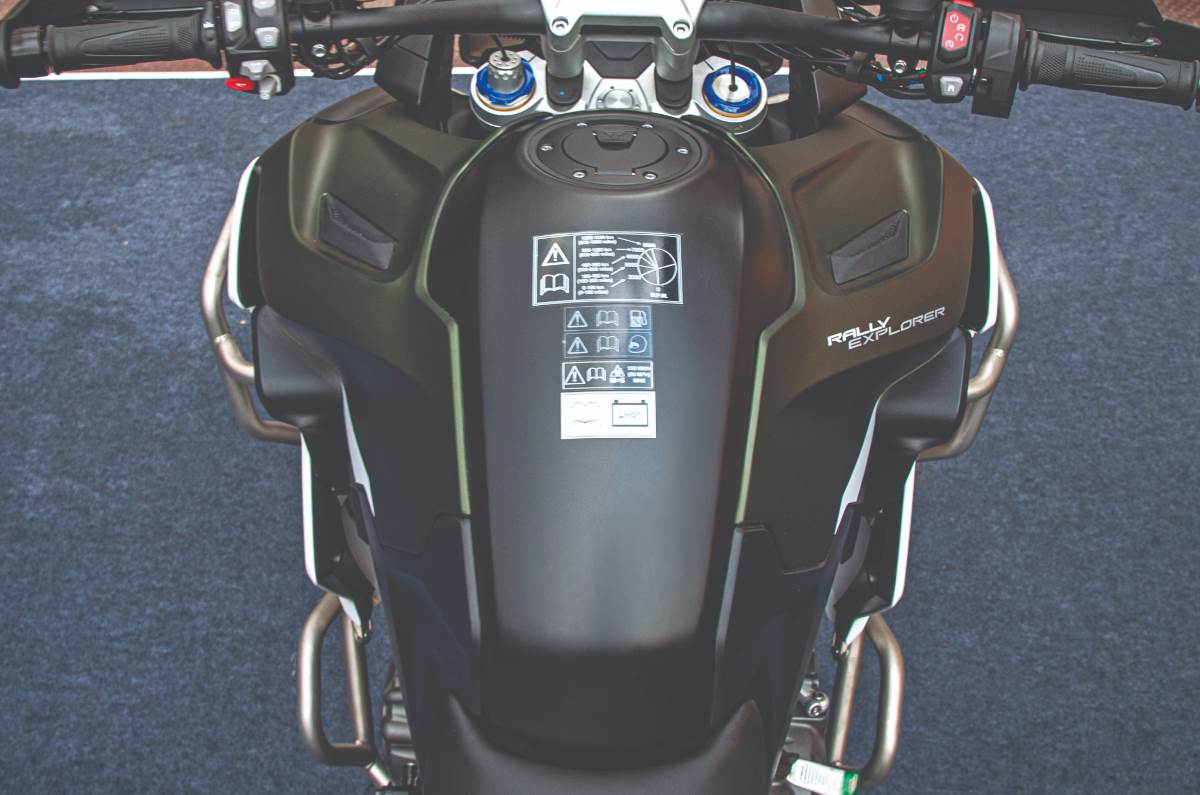
Explorer’s 30-litre fuel tank is larger by 10 litres.
However, the suspension travel on the GT is a little bit lower at 200mm at both ends; which is still quite generous. Because there’s less suspension travel and a smaller front wheel, the seat height has come down to 850mm. That crucial 25mm difference to the Rally could mean quite a bit for some people.
Other changes compared to the Rally include the fact that the GT does not get the large engine bash guard or the tubular engine protectors as standard. Both bikes you see here have Triumph’s accessory LED indicators installed and the large tubular fuel tank guards are also an optional extra.
From the rider’s point of view, everything is very similar and that’s because you interact with the bike in mostly the same way. The riding position feels the same and you have the same windscreen set-up. The riding experience, however, is a little bit different.
This motorcycle feels more conventional than the Rally, which still handles very well considering how slim its 90 section front tyre is. But the GT is even better and with its wider 120 section front tyre, it behaves more like a normal road sports motorcycle.
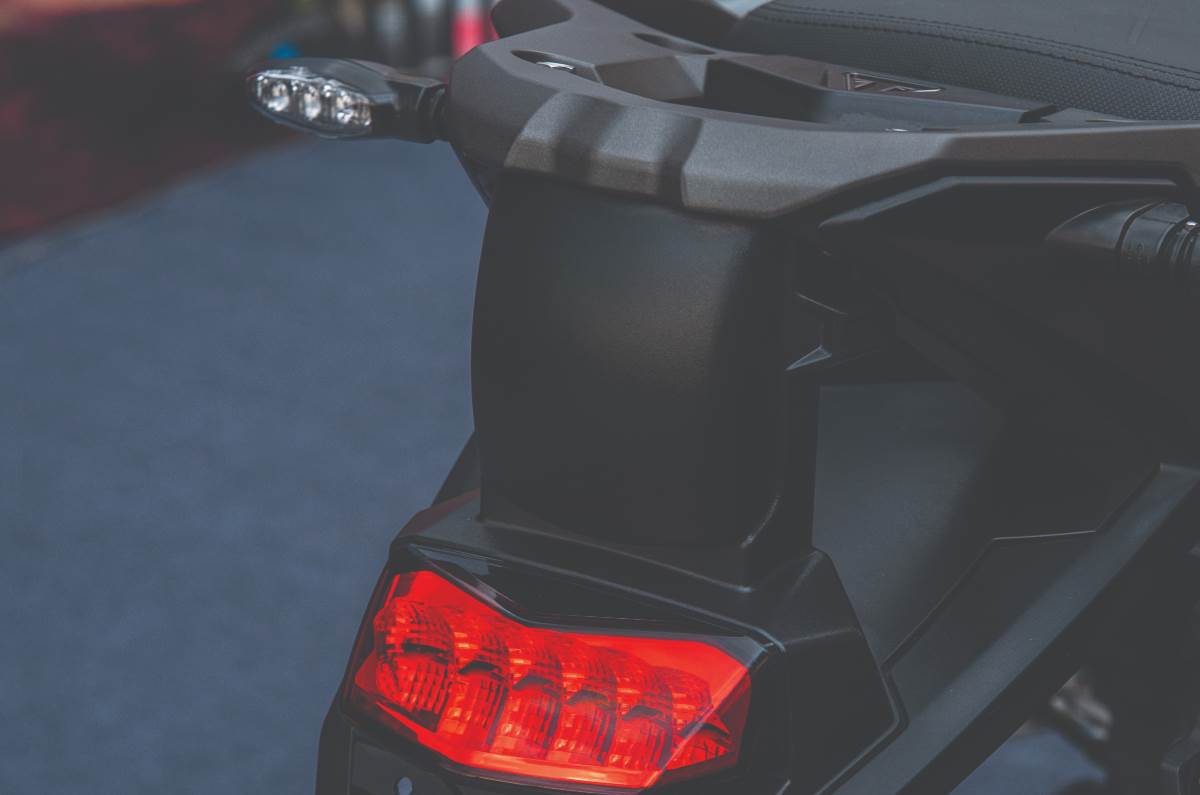
Explorer models get radar-based blind spot warning.
When it comes to bad roads, the Rally absolutely creams its way through them and the GT is almost as good, but not quite, probably thanks to the 20mm lower suspension travel. Nevertheless, this is still a supremely comfortable motorcycle on any sort of terrain and if you want to take it off-road, it has the clearance and the suspension travel. It will go almost wherever a Rally can, but just without as much confidence, aggression and ability.
Going for the kill
At the end of a long day of riding, it was abundantly clear that these new Tigers are highly impressive. If you are in the market for a full-sized ADV, you should seriously consider the new Tiger 1200 and that’s not just because it’s such a nice motorcycle, but also because Triumph has priced it quite well.
With a starting price of Rs 19.19 lakh for the GT Pro and Rs 20.19 lakh for the Rally Pro, these bikes slot a little below their equivalent rivals, and they come fully feature-loaded out of the box, which isn’t the same story with some of the competition. These new Tigers are definitely going to make an impact.
Also see:
Triumph Tiger 1200 GT Pro, Rally Pro video review




















